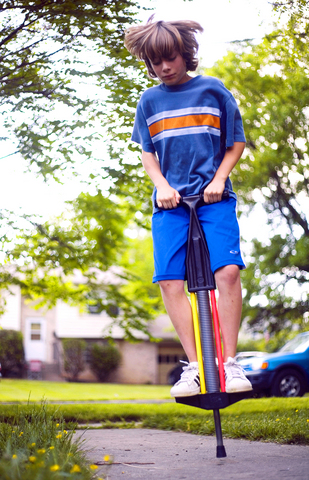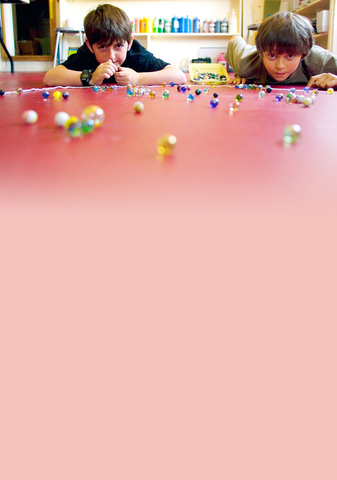Joseph Gallo, 10, of Santa Cruz, California, is well armed in the battle against childhood boredom, with a bedroom arsenal that includes a computer hooked to the Internet, a DVD player, two Game Boys, as well as an Xbox and a GameCube.
But in recent weeks, the hum of that war room of machinery has quieted because Joseph has acquired a new playtime obsession that would have seemed quaint even in his parents' day: marbles.
He can thank Michael Cohill, a toy designer and enthusiast, whose marble seminar Joseph attended at a youth fair a few weeks ago. Cohill considers himself something of a pied piper of the game, having taught it to thousands of children at schools, parks and scout meetings. "They have the exact same experience kids did with marbles a hundred years ago," said Cohill, 52.

PHOTO: NY TIMES NEWS SERVICE
Well, not exactly. Back then, children didn't need to take seminars to learn to play a no-tech, simple game. In the era of micromanaged play dates, overstuffed after-school schedules, cuts to recess and parents terrified of injuries, lawsuits and predators, many traditional childhood games have become lost arts, as antique as the concept of idle time itself.
But lately, a number of educators like Cohill, as well as parents and child-development specialists, are trying to spur a revival of traditional outdoor pastimes, including marbles, hopscotch, red rover and kickball. They are attending play conferences, teaching courses on how to play, and starting leagues for the kinds of activities that didn't used to need leagues — just, say, a stick and a ball. They are spurred by concerns that a decline in traditional play robs the imagination and inhibits social interaction, by personal nostalgia, and by a desire to create a new bridge to connect generations — a bridge across both sides of the Nintendo gap.
Although their efforts have mostly yielded modest results, a hint that they may be on to something comes with the success of an unlikely best seller, The Dangerous Book for Boys (Collins), a sepia-toned celebration of the lost arts of childhood, complete with information on how to make a tree house, fold paper airplanes and skip stones. Within days of its publication earlier this month, the book had soared to number two on Amazon's sales ranking, right behind the latest Harry Potter installment. The book, by Conn Iggulden and Hal Iggulden, may be appealing as much to fathers who are nostalgic for a youth they never quite had as to children.

PHOTO: NY TIMES NEWS SERVICE
Conn Iggulden said in an e-mail message that he routinely received correspondence from parents who yearn for a "return to simple pleasures," which seems to stem from "potent forces, like the realization that keeping your kids locked up in the house on PlayStations isn't actually that good for them; or the appalled reaction of many parents to a health-and-safety culture that prevents half the activities they took for granted as kids — and that they know were important to their growth and confidence."
Nevertheless, such simple pleasures have not always been conspicuous in the lives of children over the last two decades. "These kind of games, including tag, have practically died out," said Joan Almon, who is coordinator for the US affiliate of the Alliance for Childhood, a play advocacy group in College Park, Maryland.
Almon bemoaned the fact that she often drives through leafy suburban streets on a sunny afternoon and sees no children playing, adding, "We should be paying more attention to these classical children's games, which are almost lost now."
Joseph, in fact, compared the experience of indulging in this centuries-old activity to "being inside a video game."
Jill Gallo, Joseph's mother, is thrilled to see her son turn away from violent video games and she thinks other parents should actively work to spread the outdated pastime among children. "It won't come back naturally," said Jill Gallo, 40. "We have to introduce it. We have to support it."
Rhonda Clements, a professor of education at Manhattanville College in Purchase, New York, and a former president of the American Association for the Child's Right to Play, said that this was already happening. "There's a movement," she said of the effort to revive these games.
Her department has been sponsoring marble tournaments at local schools and trying to encourage faculty members to teach games like Four Square.
For many parents and educators, the burgeoning interest in old-fashioned games is an outgrowth of a broader campaign, spearheaded by a growing number of national and local advocacy and research organizations, like the Alliance for Childhood, or the National Institute for Play in Carmel Valley, California, to restore unstructured play in children's lives. They cite numerous studies that claim such play has many benefits, from helping children develop their imaginations to helping them learn to get along with others.
One group, New York Voices of Childhood, formed in 2005 in New York City, already counts more than 100 parents and educators as members. They are currently trying to persuade teachers to make old-fashioned play a priority within their curriculum, said Susan Ochshorn, a project coordinator for the group, who argued that games like tag and red light/green light are useful not only in alleviating stress, but helping combat obesity.
Birgit Meade, an economist for the federal government who lives in College Park, does not allow her children — Oliver, 10, and Anna, seven — to own a computer, and limits their DVD watching, she said. Instead, she encourages them to collect caterpillars or play jump rope in the front yard with friends.
Meade admits that her son runs the risk of looking like "kind of an oddball" to his friends for bouncing on a pogo stick while his friends blast away their afternoons playing video games.
Still, Oliver noted that he recently tallied 2,000 bounces in a single session. "There's a lot more things to do outdoors," he said.
Perhaps the adults' serious approach to playtime is paying off.
Kathy Spangler, the director of national partnerships for the National Recreation and Park Association in Ashburn, Virginia, which represent some 6,000 local parks departments, said she had witnessed an increase in children playing traditional games like four square, scavenger hunts and hopscotch at parks throughout the country in the last few years.
Larry Betz, of Benton, Arkansas, founder of the Little Rock Kickball Association, said that his adult league was an instant hit when it started in 2004. Meanwhile, most of their children found this old playground staple as foreign as a mortgage application. "The irony of adults playing a kids' game was lost on them," Betz said.
But after spending a few seasons on the sideline, watching their parents have fun, many children are suddenly showing interest in the game, Betz said. This year, he expects at least 150 children to turn out for a new youth division.
Cory Abate-Shen, 41, of Warren, New Jersey, cited a tinge of nostalgia as one reason she tried to teach the playmates of her twin six-year-olds, David and Philip, to leap through hopscotch courts, shimmy in hula hoops, and chase each other around the lawn in games of tag. Most kids, she said, need her direction, but once taught, "they can immediately adapt and get into it."
"You're going to see a real revolution," she predicted, sounding a bit like a Thomas Paine of retro play.
Nevertheless, some critics believe that children best fire their imaginations and hone social skills when left alone to make their own fun.
Geoffrey Godbey, a professor of recreation at Penn State University, said the idea that parents can revive old-fashioned play is contrary to the spirit of play. He blamed "boomers who want to do it themselves again because they never grew up."
His advice? "Let the kids go."
But Sara Boettrich doesn't want to. The Rochester, New York, mother has tried to exhume the old playground games of her own childhood, like seven up — which involves bouncing a red rubber ball against a wall. "I used to love that game!" Boettrich said. "My friends and I would play that for weeks."
But when she tried to pass it along to her daughter Lydia, eight, and Lydia's friends, she found that she was the one who was most spirited in bounding around on her driveway. The children followed along only as long as mom was there to supply the enthusiasm. Afterward, they tended to return to their video games.
Boettrich admitted that she hadn't seen the kids playing seven up, pickup sticks and jacks, and that she had since abandoned her attempts to spark a love of them in her daughter. She added, "I think I had more fun than she did."

April 28 to May 4 During the Japanese colonial era, a city’s “first” high school typically served Japanese students, while Taiwanese attended the “second” high school. Only in Taichung was this reversed. That’s because when Taichung First High School opened its doors on May 1, 1915 to serve Taiwanese students who were previously barred from secondary education, it was the only high school in town. Former principal Hideo Azukisawa threatened to quit when the government in 1922 attempted to transfer the “first” designation to a new local high school for Japanese students, leading to this unusual situation. Prior to the Taichung First

The Ministry of Education last month proposed a nationwide ban on mobile devices in schools, aiming to curb concerns over student phone addiction. Under the revised regulation, which will take effect in August, teachers and schools will be required to collect mobile devices — including phones, laptops and wearables devices — for safekeeping during school hours, unless they are being used for educational purposes. For Chang Fong-ching (張鳳琴), the ban will have a positive impact. “It’s a good move,” says the professor in the department of

On April 17, Chinese Nationalist Party (KMT) Chairman Eric Chu (朱立倫) launched a bold campaign to revive and revitalize the KMT base by calling for an impromptu rally at the Taipei prosecutor’s offices to protest recent arrests of KMT recall campaigners over allegations of forgery and fraud involving signatures of dead voters. The protest had no time to apply for permits and was illegal, but that played into the sense of opposition grievance at alleged weaponization of the judiciary by the Democratic Progressive Party (DPP) to “annihilate” the opposition parties. Blamed for faltering recall campaigns and faced with a KMT chair

Article 2 of the Additional Articles of the Constitution of the Republic of China (中華民國憲法增修條文) stipulates that upon a vote of no confidence in the premier, the president can dissolve the legislature within 10 days. If the legislature is dissolved, a new legislative election must be held within 60 days, and the legislators’ terms will then be reckoned from that election. Two weeks ago Taipei Mayor Chiang Wan-an (蔣萬安) of the Chinese Nationalist Party (KMT) proposed that the legislature hold a vote of no confidence in the premier and dare the president to dissolve the legislature. The legislature is currently controlled